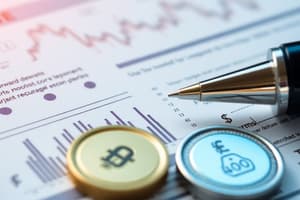Podcast
Questions and Answers
The four main components of a forward contract include expiration date, quantity, price, and market exchange.
The four main components of a forward contract include expiration date, quantity, price, and market exchange.
False (B)
If the price of the underlying asset increases, the short position benefits in a forward contract.
If the price of the underlying asset increases, the short position benefits in a forward contract.
False (B)
Forward contracts are traded on centralized exchanges.
Forward contracts are traded on centralized exchanges.
False (B)
In a forward contract, default risk is not a consideration.
In a forward contract, default risk is not a consideration.
A forward contract is a contract to buy or sell an asset at a specific price on a specified date in the future.
A forward contract is a contract to buy or sell an asset at a specific price on a specified date in the future.
Forward contracts are mainly used to speculate on asset prices.
Forward contracts are mainly used to speculate on asset prices.
A forward contract is considered a type of option.
A forward contract is considered a type of option.
Forward contracts are traded on organized exchanges.
Forward contracts are traded on organized exchanges.
The long position in a forward contract is the eventual seller who delivers the assets in exchange for money at the predetermined delivery price.
The long position in a forward contract is the eventual seller who delivers the assets in exchange for money at the predetermined delivery price.
The future date on which the transaction (delivery) will take place in a forward contract is called the contract's expiration date.
The future date on which the transaction (delivery) will take place in a forward contract is called the contract's expiration date.
In a forward contract, the long position is the eventual buyer who receives the underlying assets at the predetermined delivery price. True or false?
In a forward contract, the long position is the eventual buyer who receives the underlying assets at the predetermined delivery price. True or false?
A forward contract is considered a type of option. True or false?
A forward contract is considered a type of option. True or false?
Forward contracts are mainly used to speculate on asset prices. True or false?
Forward contracts are mainly used to speculate on asset prices. True or false?
The future date on which the transaction (delivery) will take place in a forward contract is called the contract's expiration date. True or false?
The future date on which the transaction (delivery) will take place in a forward contract is called the contract's expiration date. True or false?
If the price of the underlying asset increases, the short position benefits in a forward contract. True or false?
If the price of the underlying asset increases, the short position benefits in a forward contract. True or false?
In a forward contract, if the price of the underlying asset increases, the long position benefits.
In a forward contract, if the price of the underlying asset increases, the long position benefits.
Forward contracts are commonly traded on centralized exchanges.
Forward contracts are commonly traded on centralized exchanges.
The main components of a forward contract include expiration date, quantity, price, and market exchange.
The main components of a forward contract include expiration date, quantity, price, and market exchange.
A forward contract is mainly used to speculate on asset prices.
A forward contract is mainly used to speculate on asset prices.
Default risk is not a consideration in a forward contract.
Default risk is not a consideration in a forward contract.
Flashcards are hidden until you start studying
Study Notes
Forward Contracts Overview
- Definition: A forward contract is an agreement to buy or sell an asset at a specific price on a specified date in the future.
- Main Components: Key elements include expiration date, quantity, price, and market exchange.
Positions in Forward Contracts
- Long Position: The buyer, who receives the underlying asset at the predetermined price upon contract expiration.
- Short Position: The seller, who delivers the underlying asset in exchange for money at the predetermined delivery price.
Trading and Usage
- Market: Forward contracts are traded on centralized exchanges.
- Purpose: Primarily used to speculate on future asset prices; considered a financial instrument for hedging as well.
Risk Considerations
- Default Risk: Not a consideration in forward contracts, making them distinct from options.
Price Movement Implications
- Increasing Underlying Asset Price: If the asset's price rises, the long position benefits, as they buy at a lower predetermined price, while the short position does not benefit.
Additional Concept Clarifications
- Forward Contracts vs Options: A forward contract is not classified as a type of option, highlighting a key distinction in financial contracts.
Studying That Suits You
Use AI to generate personalized quizzes and flashcards to suit your learning preferences.




